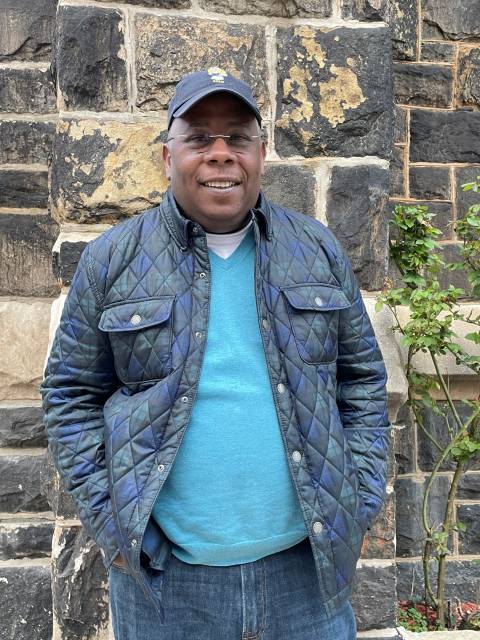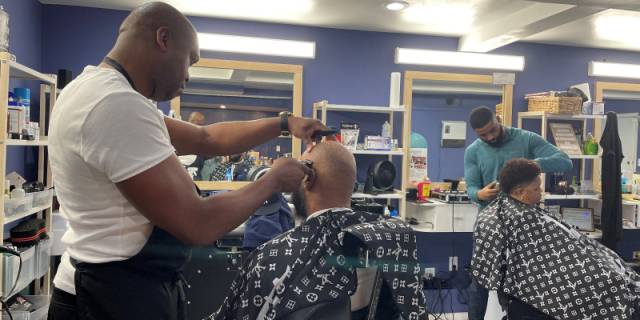You are here
Great Hair and Good Company: Local Barbershops Take on Community Education
For many of us, going to get a haircut means more than just changing our look. It’s a chance to connect with others around us. We might discuss our personal lives, the news or our favorite TV shows. We might even get some sage advice from our stylist. As conversations flow, community and connection are forged within the walls of local hair salons and barbershops.
Four years ago, that sense of community was nearly shattered for Troy Staton, then the owner of New Beginnings Barbershop in the Hollins Market neighborhood of Baltimore. In October 2018, a young man came into New Beginnings with a gun and began shooting, wounding Staton and another customer. Staton survived and took this senseless act of violence as a sign that he should do more for his beloved hometown.
“A bullet didn’t stop me, it spurred me to action,” said Staton.
And action was sorely needed. As a longtime resident of this tightly-knit neighborhood, Staton knew that his neighbors were under tremendous strain–experiencing unemployment, poverty and crime, with limited access to health care, education and even healthy food options.
In 2019, Staton formed More Than a Shop (MTAS), a network of Black-owned barbershops and beauty salons in Baltimore, dedicated to community outreach. Through partnerships with health care providers and the City of Baltimore, the MTAS shops have become community staples and spaces to access vital services, including health care clinics and legal assistance.
The COVID-19 pandemic deeply impacted many of the neighborhoods that the MTAS network served. Distrust and misinformation resulted in low vaccination rates, leaving far too many residents unprotected.
MTAS has stepped in and taken on an important new role as longstanding community staples of Black and Brown neighborhoods. With support from the CDC Foundation, MTAS began to train barbers and stylists in how to communicate accurate information about COVID-19 and the vaccine to their clientele.
MTAS also produces written materials for barbershops and salons to share with their clients. These flyers and pamphlets provide accurate information, dispel myths, assist with building trust between African Americans and the medical system, and help guide courageous conversations about topics like vaccine mandates.
Participants are encouraged to share their own COVID-19 experiences with their customers, including their reasons for getting vaccinated. As clients often spend many hours in salons and barbershops, there are ample opportunities for these important conversations. “I’m in the barber shop twice a week getting my hair cut,” said West Baltimore native and MTAS strategic partner Larry Simmons. “And I also go into the barber shop even when I don’t need a haircut, because it’s where my friends are.”
So far, MTAS has trained over a hundred barbers and stylists through their vaccine outreach. The organization has developed materials in conjunction with RnD Associates and has also partnered with the University of Maryland Medical System, Kaiser Permanente and the Baltimore City Health Department to sponsor dozens of events including informational Shop Talks and pop-up vaccination clinics at local barbershops and salons. MTAS plans to expand their events and partnerships with local boxing gyms and include barbershops located in Latino/a/x communities.
Four years after the shooting in Troy Staton’s barbershop, the bullet hole in the wall remains. For Staton, it serves as a powerful reminder to never take anything for granted. With that in mind, he proudly continues to use his unique profession to give back to the city he loves.
“We’re more than barbers, we’re more than stylists,” said Staton. “We know our community, they trust us, and we have a direct impact on the demographics that are normally overlooked.”
Troy Staton believes the More Than A Shop model he’s developed in Baltimore can be used in other cities and that barbershops and hair salons can help to build strong, healthy communities across the country.
Funding for this effort is made possible through a subaward from the CDC Foundation and is part of the Centers for Disease Control and Prevention (CDC) of the U.S. Department of Health and Human Services (HHS) financial assistance award totaling $25,660,048 with 100 percent funding from CDC/HHS. The contents are those of the author(s) and do not necessarily represent the official views of, nor an endorsement by, CDC/HHS or the U.S. Government.



